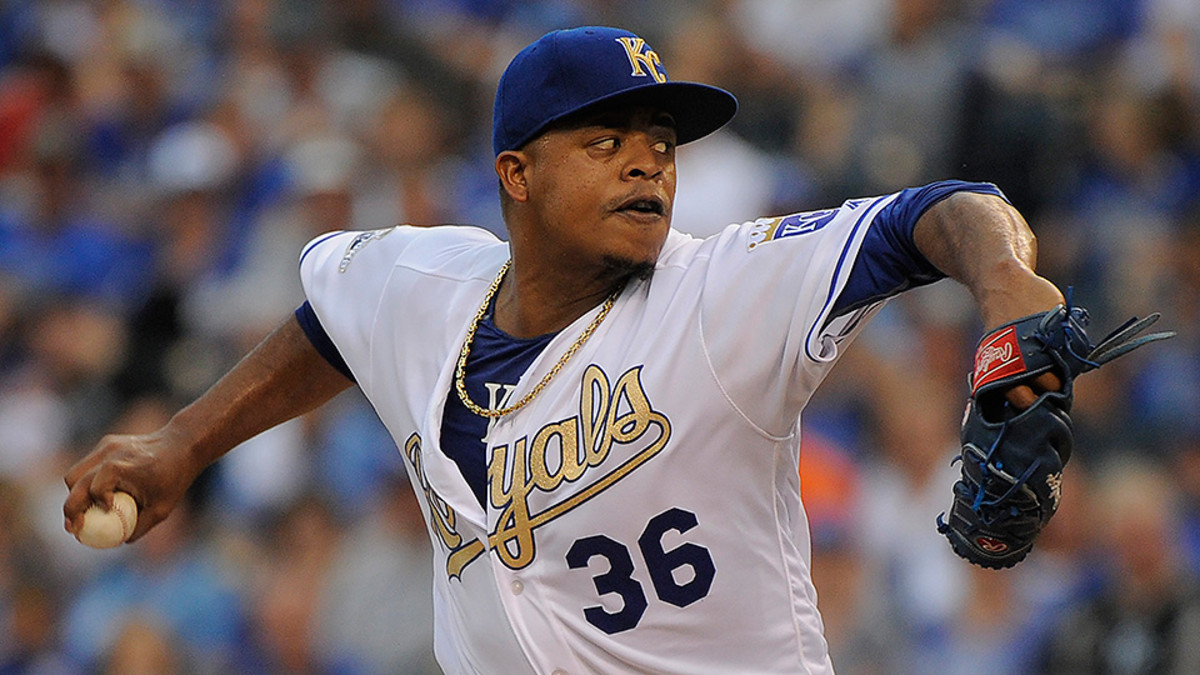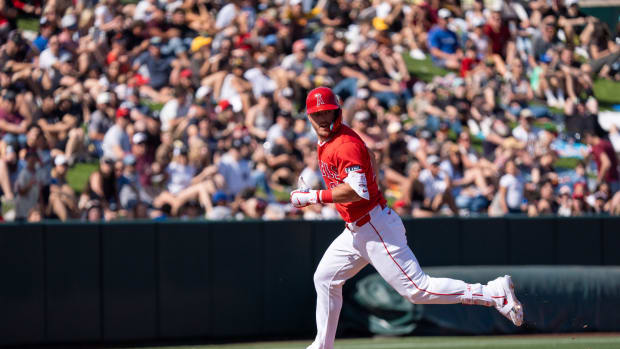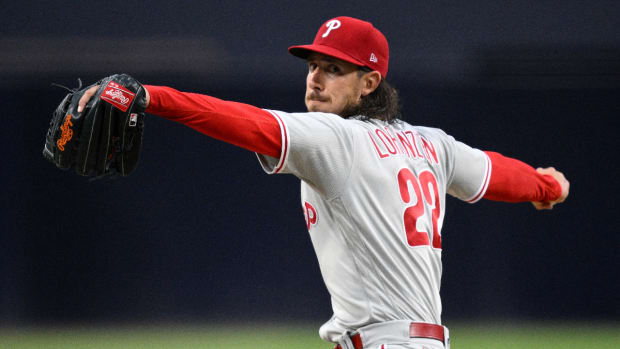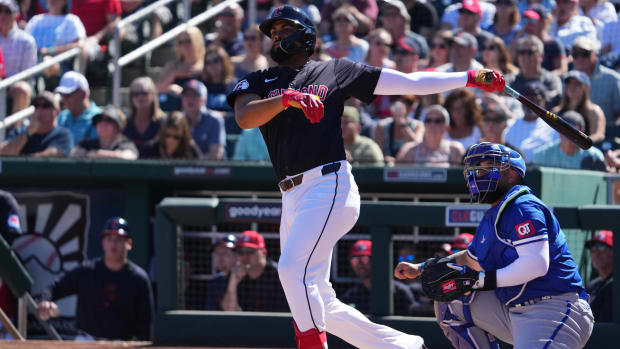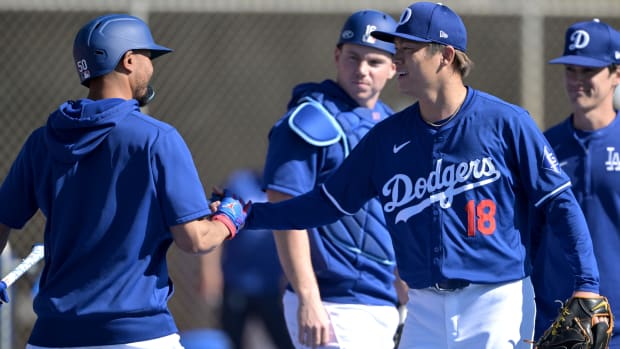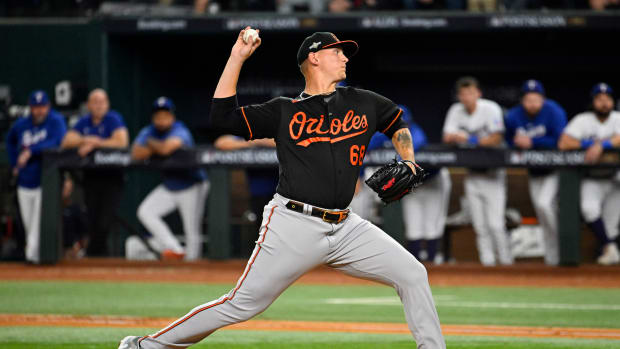Edinson Volquez’s disastrous start against Astros among worst ever
Your teams. Your favorite writers. Wherever you want them. Personalize SI with our new App. Install on iOS or Android.
Near-perfect games by Clayton Kershaw and Max Scherzer have prompted me to write about some of the best starting pitching performances in major league history in recent seasons, but it never occurred to me to research the worst single-game performance by a starting pitcher until Friday night. That’s when Edinson Volquez, the de facto ace of the defending world champion Kansas City Royals, turned in what very well may have been the worst starting pitching performance in major league history.
Volquez faced 15 Astros hitters Friday night in the Royals’ 13–4 loss to Houston at Kaufman Stadium. He retired three of them. The other 12 came around to score. We only have game logs going back to 1913, but in the 103 1/2 seasons covered by that data, Volquez is the first pitcher ever to be charged with 12 runs without recording an out in the second inning of a game he started.
Why Nationals’ Taylor may have had the worst game in baseball history
Yes, there have been pitchers who have given up more runs. The Athletics Tom Sheehan gave up 20 runs (12 earned) in a complete game loss to the Senators in the second game of a double-header in 1915, but that’s only eight more runs than Volquez allowed (and only one more earned) while getting 21 more outs. In fact, there have been 79 games since 1913 in which a starting pitcher allowed more runs than Volquez allowed Friday night, but every one of those pitchers completed at least two innings (twice as many as Volquez) and every pitcher who allowed more than Volquez’s 11 earned runs retired at least eight batters. Volquez retired three.
One can’t even use the error committed behind him during his disastrous first inning as an excuse for Volquez, as it came with just one out and the bases were cleared by a home run before Volquez got what would have been the third out of the inning had that play been made.
Before we go any further. Here’s how Volquez’s evening played out:
The first pitch Volquez threw was a ball inside to George Springer. The second was hit off the top of the centerfield wall, and the tip of the leaping Lorenzo Cain’s glove, for a triple. Volquez then fell behind Marwin Gonzalez 1–0 and 3–1 before giving up a single down the rightfield line that plated Springer. Jose Altuve followed by shooting a first-pitch single past shortstop Alcides Escobar, pushing Gonzalez to second.
• VERDUCCI: Is the rising homer rate good for baseball?
At that point, Volquez got his first out, getting ahead of Carlos Correa with a pair of strikes then getting him to hit what looked like a possible double-play ball to second base only for the grounder to be too slow to double-up the speedy Correa at first. The result was a fielder’s choice that left runners at the corner with one out and just one run in. Things seemed manageable at that point, but six more batters would come to the plate before Volquez would record another out.
Colby Rasmus hit a 2–0 pitch off the rightfield wall for a long single that plated Gonzalez and sent Correa to third. Carlos Gomez singled to left to drive in Correa. Luis Valbuena walked on five pitches to load the bases, the only strike coming on a gimme 3–0 pitch right down the middle. Then came the error.
Evan Gattis popped a 2–2 pitch up to shallow left, but rookie leftfielder Brett Eibner and Escobar, ranging out from shortstop, had a miscommunication on the play, resulting in Eibner, who had the easier play on the ball, veering off and Escobar failing to make the catch. That brought home Rasmus with the fourth run of the game and kept the bases loaded. Jason Castro followed with another 2–0 single to right, plating Gomez and again leaving the bases loaded.
That turned the order over and brought Springer back to the plate. Volquez had thrown 31 pitches at that point, allowed five runs, and had the bases loaded with just one man out. If there was an ideal time to pull Volquez, this would have been it. Instead, Volquez remained in the game to face Springer. Having just hit against Volquez 17 minutes earlier, Springer jumped on the first pitch he saw, a curveball down the middle, and hit it over the leftfield wall for a grand slam. With that, Springer became the first player to hit a triple and a grand slam in the same inning since Detroit’s Brandon Inge in 2004 and the first leadoff hitter to hit a grand slam in the first inning since Mariners rookie Danny Tartabull hit one off future Hall of Famer Don Sutton on April 15, 1986.
#http://www.120sports.com/video/v185946122/astros-embarrass-the-royals
It was only then, down 9–0, the Volquez finally got the final two outs of the first, getting Gonzalez and Altuve to ground out on four more pitches. However, when he came back out for the second inning with the hope of at least eating some innings for his team and saving the bullpen, Volquez walked the first man he saw, Correa, on five pitches, gave up another single to Rasmus, then walked Gomez on four pitches, finally getting the hook with the bases again loaded, no one out, and 48 pitches expended in total.
Doing his part, Dillon Gee struck out the first man he faced in relief of Volquez, then let all three of his inherited runners score on a single by Gattis, a bases-loaded walk to Castro, and an RBI groundout by Springer.
The end result was this line for Volquez:
1 IP, 8 H, 12 R, 11 ER, 3 BB, 0 K, 1 HR, 48 pitches, 23 of them strikes.
Was that the worst start of the last 104 years?
• Awards Watch: Donaldson, Altuve, Trout do battle in terrific AL MVP race
Not by my reasoning, though it likely was one of the five worst. Looking over the list of just 12 starts since 1913 in which a pitcher allowed 10 or more runs while recording three or fewer outs, I’ve identified these four potential rivals to Volquez. Amazingly, three of them were by Royals’ pitchers, one of them by one of Volquez’s rotation mates just last year, and the fourth by a member of the Houston Astros.
Taking them in reverse chronological order:
Jeremy Guthrie, Royals @ Yankees, May 25, 2015
Final line: 1 IP, 9 H, 11 R, 11 ER, 3 BB, 1 K, 4 HR
Guthrie gave up eight runs in the first and three in the second, but all 11 runs scored on his watch, all of them scoring on those four home runs (by Chase Headley, Brian McCann, Brett Gardner and Stephen Drew). There were also no errors made behind Guthrie. However, Guthrie did manage to strand two runners in the first by striking out Mark Teixeira. Volquez stranded no runners and struck out no one.
Brian Bannister, Royals @ Yankees, Aug. 17, 2008
Final line: 1 IP, 10 H, 10 R, 10 ER, 3 BB, 0 K, 3 HR
Bannister allowed just six runs in the first inning, stranding Brett Gardner at third after a two-out RBI triple, but the first four men he faced in the second inning all scored on Jason Giambi’s grand slam, after which Bannister allowed two more singles before finally getting the hook from manager Trey Hillman. Again, all 10 runs scored on Bannister’s watch, there was no error committed behind him, and he bequeathed two runners to his bullpen who just as easily could have scored, as Volquez’s did. However Bannister did get his third out with three fewer runs scoring than Volquez had allowed by that point in the game.
• 2001 Mariners, 2016 Cubs hold steady in winningest team rankings
Jason Jennings, Padres @ Astros, July 29, 2007
Final line: 2/3 IP, 8 H, 11 R, 11 ER, 3 BB, 0 K, 2 HR
There’s no real argument for Volquez here. Jennings gave up all 11 runs on his own, without the help of a fielding error or the bullpen—the last four runs he allowed scored on home runs by Mike Cameron and Adrian Gonzalez. Jennings didn’t even get the third out of the first inning, and of the two outs he did get, one was a sac fly that plated a run.
Luke Hudson, Royals @ Indians, August 13, 2006
Final line: 1/3 IP, 8 H, 11 R, 10 ER, 3 BB, 1 K, 1 HR
Hudson allowed 11 runs while recording just one out, and all 11 scored on his watch, the last four coming around on Travis Hafner’s single-season record tying sixth grand slam of the 2006 season. However, there was an error in this inning. That came on a botched forceout at second base with runners on the corners. Might that have been a botched double-play ball? I can’t say without footage of the game. The Associated Pressgame story calls it “a fielder’s choice grounder,” so perhaps not, but if there was a chance to turn two there, Hudson could arguably be said to have pitched better than Jennings. As it stands, he should have matched Jennings by recording two outs, and Hudson had one strikeout where Jennings had none.
• Trayce Thompson emerging from NBA star brother Klay’s shadow
Either way, it seems safe to say that Hudson and Jennings were both worse in their outings than Volquez was in his Friday night, but where you place Volquez relative to Bannister and Guthrie is more a matter of taste. My personal list would look like this, counting down to the worst starts from the last 104 seasons:
5. Edinson Volquez, Royals, June 24, 2016
4. Jeremy Guthrie, Royals, May 25, 2015
3. Brian Bannister, Royals, August 17, 2008
2. Luke Hudson, Royals, August 13, 2006
1. Jason Jennings, Astros, July 29, 2007
I can’t explain the confluence of Royals. I didn’t even include Tom Gordon’s December 2, 1995 start for Kansas City, which also made the list of a dozen starts with 10 or more runs allowed and three or fewer outs recorded, as only eight of Gordon’s runs scored while he was still in the game. As for why all of these starts have taken place in the last 11 seasons, I attribute that to the increased concern for the health of pitchers arms. In the past, pitchers who pitched so poorly would have been forced to “wear it.” That is, make up for their poor performance by eating innings, taking any additional bruising in turn.
Is Astros' sudden turnaround enough to make them contenders again?
Another reason is that last decade saw some of the highest scoring levels in the game’s history. There were 4.86 runs scored per game in 2006 and 4.80 in 2007, the latter being more than in any season from 1951 to 1993, as well as more than in any season since. That context could be used to justify moving Volquez and Guthrie up the list. However, run scoring has trended back up the last two years, with teams averaging 4.25 runs per game last year and 4.40 runs per game this season entering Friday’s action, a rate of scoring that would be the highest since 2009 if it keeps up or increases.
Regardless of the reasons, or the comparable games from the last decade, Volquez’s outing Friday night was terrible enough to be something special. Volquez was in the game for roughly a half hour, including the time it took the Royals to hit in the bottom of the first, already down 9–0, yet managed to raised his season ERA by 1.02 runs. As significant as Volquez’s disaster outing was, however, what was perhaps most significant was that the resulting loss brought the surging Astros, who are set to call up first base prospect A.J. Reed on Saturday, to within one game of the Royals in the American League wild-card race.






























